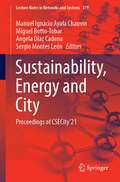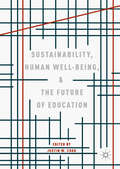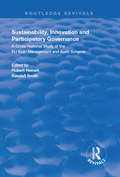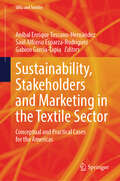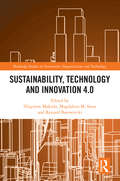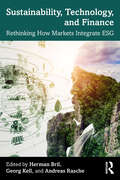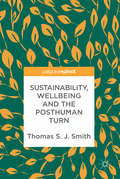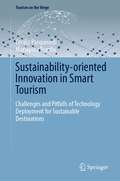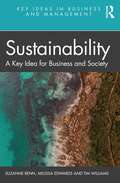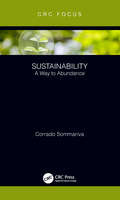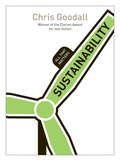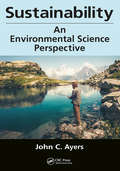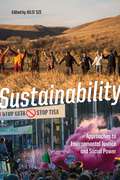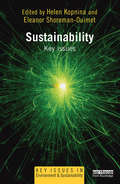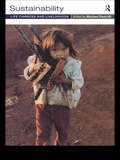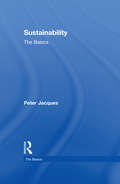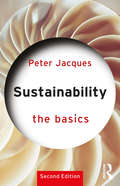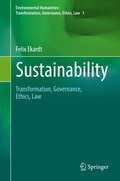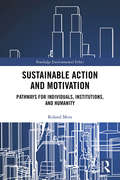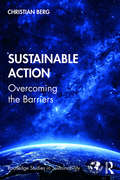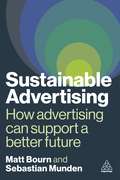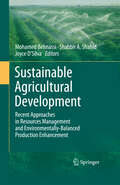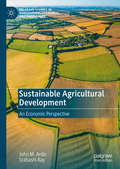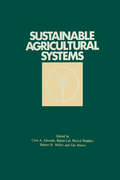- Table View
- List View
Sustainability, Energy and City: Proceedings of CSECity’21 (Lecture Notes in Networks and Systems #379)
by Miguel Botto-Tobar Angela Díaz Cadena Sergio Montes León Manuel Ignacio Ayala ChauvinThis book constitutes the proceedings of the 1st Congress in Sustainability, Energy and City (CSECity’21) held in Ambato, Ecuador, on June 28–29, 2021, proudly organized by Universidad Tecnológica Indoamerica in collaboration with GDEON. The CSECity brings together experts that promotes the dissemination of advances in sustainability, urbanism, energy, and industry research through the presentation of keynote conferences. In CSECity, theoretical, technical, or application works that are research products are presented to discuss and debate ideas, experiences, and challenges. Presenting high-quality, peer-reviewed papers, the book discusses the following topics: Energy sustainability Information and knowledge management Information technologies Innovation, technology, and society Software and systems modeling Software systems, architectures, applications, and tools Sustainable energy and the city.
Sustainability, Human Well-Being, and the Future of Education
by Justin W. CookThis open access book explores the key dimensions of a future education system designed to enable individuals, schools, and communities to achieve the twin twenty-first century challenges of sustainability and human well-being. For much of the twentieth century, Western education systems prepared students to enter the workforce, contribute to society and succeed in relatively predictable contexts. Today, people are at the controls of the planet—making decisions that are dramatically reshaping social, economic, and environmental systems at a global scale. What is education’s purpose in this new reality? What and how must we learn now? The volatility and uncertainty caused by digitalization, globalization, and climate change weave a common backdrop through each chapter. Using case studies drawn from Finland and the US, chapter authors explore various aspects of learning and education system design through the lenses of sustainability and human well-being to evaluate how our understanding and practice of education must transform. Using their scholarly research and experience as practitioners, the authors propose new approaches to preparing learners for a new frontier of the human experience fraught with risks but full of opportunity.
Sustainability, Innovation and Participatory Governance: A Cross-National Study of the EU Eco-Management and Audit Scheme (Ashgate Studies In Environmental Policy And Practice Ser.)
by Hubert HeineltTitle first published in 2003. This book focuses on whether participatory governance can lead to sustainable and innovative outcomes. Using an empirical analysis of the development, implementation and review of an EU environmental management system - the Eco-Management and Audit Scheme (EMAS), it examines under which circumstances participatory governance might encourage sustainability and innovation.
Sustainability, Stakeholders and Marketing in the Textile Sector: Conceptual and Practical Cases for the Americas (SDGs and Textiles)
by Aníbal Enrique Toscano-Hernández Saúl Alfonso Esparza-Rodríguez Gabino García-TapiaGeospatial analysis of the Sustainable Value Chain in the Textile sector of the United States.- Sustainable practices in the textile sector: Case study of the global value chain of the American economies.- Exploring eco-innovation performance in the textile industry: Case of two export-oriented Colombian firms.- Transformational and sustainable leadership in textile companies in Lima: a qualitative study.- Obstacles to innovation in textile SMEs in the Usaquen district of Bogota, Colombia 100 Reverse Logistics: A view from green capitalism and circular economy in textile companies in Mexico.- Green marketing strategies in sustainable fashion business models.- Green marketing and its contribution to the competitiveness of the textile and apparel sector. Case study in Cali.- The green swan´s theory and circular economy and it’s influence in regenerative capitalism.- Competitiveness of decent work of the us textile sector using a multivariable classification of the sdg 8 target 5: full employment and decent work.- Critical evaluation of successful strategies for sustainable manufacturing in the textile sector and their impact on the sustainable development goals: Case studies in Colombia.
Sustainability, Technology and Innovation 4.0 (Routledge Studies in Innovation, Organizations and Technology)
by Zbigniew Makieła, Magdalena M. Stuss and Ryszard BorowieckiSustainability, Technology and Innovation 4.0 is a holistic perception and analysis of innovation at the level of public organisations, innovation in industry and innovation in HR. Its chapters collectively present a thesis that Innovation 4.0 signals a technological revolution that has the opportunity to prevent environmental degradation and, in particular, to stop climate warming, the effects of which may disrupt the process of sustainable development. Uniquely, this edited book offers a comprehensive and multi-faceted examination of Innovation 4.0, fulfilling methodical, empirical and utilitarian goals. The methodological objective is to present tools that allow the identification, analysis and assessment of the relationship between Innovation 4.0 and inspiration that will carry society towards a new economic and social order. Its empirical aim is to enable the analysis and evaluation of the role of public organisations, innovation in industry and innovation in HR in the process of building sustainable development of the global environment. The book’s utilitarian goal is a recommendation for global organisations of Innovation 4.0 as an instrument to stimulate an innovative economy. This is a high-level research book aimed at postgraduates, MBA students, researchers and academics from business colleges and universities, and may also provide a valuable strategic perspective for business executives.
Sustainability, Technology, and Finance: Rethinking How Markets Integrate ESG
by Andreas Rasche Georg Kell Herman BrilThis book explores the swiftly emerging nexus between sustainability, finance, and technology. Leading practitioners and academic thought leaders reflect on the ways in which technology and digitalization shape how sustainable finance professionals address environmental, social, and governance (ESG) issues. Together, the contributors identify three spheres in which technology shapes how investors make sense of such issues: ESG and technology: finance professionals need to know about how technological innovations, such as chemical recycling for plastics, in the real economy shape firms’ ESG performance; ESG through technology: technological developments, such as AI and blockchain, can enable finance professionals to offer more fine-grained ESG analyses; and ESG as technology: the ESG agenda itself is influenced by technological developments that are not well understood by practitioners (e.g., data mining for Bitcoin creating significant emissions). Using practically relevant examples and recent insights from people working in the field, the book explores the linkages between sustainability, technology, and finance in different contexts and shows how practitioners can accelerate needed change processes. This book primarily addresses practitioners in companies and investment firms as well as students enrolled in executive education and MBA programs.
Sustainability, Wellbeing and the Posthuman Turn
by Thomas S. SmithThis book examines how the way we conceive of, or measure, the environment changes the way we interact with it. Thomas Smith posits that environmentalism and sustainable development have become increasingly post-political, characterised by abstraction, and quantification to an unprecedented extent. As such, the book argues that our ways of measuring both the environment, such as through sustainability metrics like footprints and Payments for Ecosystem Services, and society, through gross domestic product and wellbeing measures, play a constitutive and problematic role in how we conceive of ourselves in the world. Subsequently, as the quantified environmental approach drives a dualistic wedge between the human and non-human realms, in its final section the book puts forward recent developments in new materialism and feminist ethics of care as providing practical ways of re-founding sustainable development in a way that firmly acknowledges human-ecological relations. This book will be an invaluable reference for scholars and students in the fields of human geography, political ecology, and environmental sociology.
Sustainability-oriented Innovation in Smart Tourism: Challenges and Pitfalls of Technology Deployment for Sustainable Destinations (Tourism on the Verge)
by Cecilia Pasquinelli Mariapina TrunfioThis book combines research on technology-driven and social-driven innovation in tourism destinations and the multifaceted concept of sustainability, providing an integrative understanding of the nexus between smartness and sustainability within destinations. It engages theoretically and empirically with the research question of how, and to what extent, smart technologies drive tourism innovation focussed on sustainability. Although innovation and technology are widely considered the way to sustainable tourism growth, further studies need to size the role of technology and critically address modalities, challenges, opportunities and pitfalls of technology deployment in rebalancing tourism disequilibria within local systems. Local, national, and supranational policymakers’ attention to technology investments, the widening technological frontiers, and the enthusiasm for new technological opportunities to build, manage, and market destinations suggest the relevance of this research agenda. This book provides scholars, postgraduate students, and practitioners with conceptual and empirical insights into smart solutions and innovative destination models for multi-stakeholder engagement to manage and address tourism impacts and imbalances. The book outlines scenarios of sustainability-oriented innovation, encompassing and intertwining technological, social, human, and cultural co-drivers as the necessary conditions for smart technologies to enhance sustainable destinations effectively and improve human wellbeing and societal development.
Sustainability: A Key Idea for Business and Society (Key Ideas in Business and Management)
by Tim Williams Suzanne Benn Melissa EdwardsThe heightening impact of ecological and societal crises makes sustainability an increasingly urgent imperative, requiring a fundamental shift in how we understand and practice management and business. In this book, the authors set out the key characteristics of sustainability such as its temporal and multilevel effects and highlight the complex array of sustainability risks and opportunities for business and management. Setting business within a systems perspective, the authors outline different sustainability discourses that frame how business responds to the sustainability imperative. They call for the normative and scientific approaches to sustainability to be merged so that a new transdisciplinary approach that brings together the material and relational traditions in sustainability management is developed. Sustainability work is understood as the reframing of tools, technologies, practices and business strategies to respond to the imperative. The book concludes by highlighting dynamic features of the imperative as it is shaped by the urgent need to restore and regenerate social and ecological systems. Sustainability transitions such as the Circular Economy and Net Zero are suggested as inspiration for profound business transformation. By facing the intractable complexity associated with sustainability, this book challenges students and scholars to draw from across the sciences and social sciences to understand, reflect upon and deliver responsible business outcomes in contemporary society.
Sustainability: A Way to Abundance
by Corrado SommarivaThe book describes mechanisms whereby the Earth naturally thrives towards energy and resources abundance and how unsustainable industrial practices alter this trend. Introduces the concept of earth energy and associates this to the conditions of the biosphere and emphasizes the possibilities with inexpensive wind and solar energy Provides a good quantification of the concepts of sustainability and its effects on the environmentn and critical analysis and updates to the relationships between the environmental impact, affluence and technology
Sustainability: All That Matters
by Chris GoodallBuilding a sustainable society is perhaps the greatest test that the world has ever faced. Prosperity has been created by ruthless and ill-disciplined mining of the world's resources, compounded by a cavalier disregard for the implications of pollution from industrial and agricultural processes. Today's generation has borrowed from the future by grabbing prosperity now and imposing the cost on the next generation. In this startling and informative book, which will appeal to both students and general readers, award-winning writer Chris Goodall provides a coherent new explanation of what sustainability actually is. Goodall then goes onto explore nine key sustainability challenges, applying the theory of sustainability to look at food, travel, clothing, electricity, heating and cooling, paper and cardboard, construction, consumer electronics, and air travel.
Sustainability: All That Matters (All That Matters)
by Chris GoodallBuilding a sustainable society is perhaps the greatest test that the world has ever faced. Prosperity has been created by ruthless and ill-disciplined mining of the world's resources, compounded by a cavalier disregard for the implications of pollution from industrial and agricultural processes. Today's generation has borrowed from the future by grabbing prosperity now and imposing the cost on the next generation. In this startling and informative book, which will appeal to both students and general readers, award-winning writer Chris Goodall provides a coherent new explanation of what sustainability actually is. Goodall then goes onto explore nine key sustainability challenges, applying the theory of sustainability to look at food, travel, clothing, electricity, heating and cooling, paper and cardboard, construction, consumer electronics, and air travel.
Sustainability: An Environmental Science Perspective
by John C. AyersThis book presents an earth science-based overview of the challenges to sustainability. It provides a detailed study of climate change, as well as energy, food, and water security across different regions. The author uncovers the problems caused by current social and environmental practices, and offers potential solutions. Focusing on systems theory, footprint analysis, risk, and resilience, many examples are given of how to use resources sustainably, especially common pool resources such as the atmosphere, oceans, and groundwater. The book develops its ideas from an array of practical case studies, centering on communal objectives and shared responsibilities.
Sustainability: Approaches to Environmental Justice and Social Power
by Julie SzeA critical resource for approaching sustainability across the disciplines Sustainability and social justice remain elusive even though each is unattainable without the other. Across the industrialized West and the Global South, unsustainable practices and social inequities exacerbate one another. How do social justice and sustainability connect? What does sustainability mean and, most importantly, how can we achieve it with justice? This volume tackles these questions, placing social justice and interdisciplinary approaches at the center of efforts for a more sustainable world. Contributors present empirical case studies that illustrate how sustainability can take place without contributing to social inequality. From indigenous land rights, climate conflict, militarization and urban drought resilience, the book offers examples of ways in which sustainability and social justice strengthen one another. Through an understanding of history, diverse cultural traditions, and complexity in relation to race, class, and gender, this volume demonstrates ways in which sustainability can help to shape better and more robust solutions to the world’s most pressing problems. Blending methods from the humanities, environmental sciences and the humanistic social sciences, this book offers an essential guide for the next generation of global citizens.
Sustainability: Key Issues (Key Issues in Environment and Sustainability)
by Eleanor Shoreman-Ouimet Helen KopninaSustainability: Key Issues is a comprehensive introductory textbook for undergraduate and postgraduate students doing courses in sustainability. Highly original, it covers the very broad spectrum of ideas covered under sustainability, from participation, resilience, growth, ecological modernism through to culture, sustainable communities and sustainable consumption. Each chapter covers one key idea, and has been written by an expert in that field. This book makes key issues approachable, with each chapter containing: a definition of the key concept a history of how and why the issue has emerged a discussion of the advantages, drawbacks, main contributions and controversies associated with this issue case studies to demonstrate how it works in reality critical discussion of mainstream models of sustainability and the reason why they don't work introduction of beyond-the-convention alternatives, including circular economy and cradle to cradle approaches This is the ideal book for students and anyone interested in understanding the key issues within sustainability and how they interact.
Sustainability: Life Chances and Livelihoods
by Michael RedcliftThe concept of sustainability is traditionally viewed in exclusively environmental terms. Sustainability: Life Chances and Livelihoods links peoples livelihoods and life chances to the concept of sustainability by examining the way in which social and economic processes complement and compound environmental change. Looking at the main ingredients of sustainable development - health, economic policy, land use, ethics and education, in both the north and south, this book demonstrates the way in which the life chances of individuals both effect and are affected by, their environments.Sustainability: Life Chances and Livelihoods shows that the scope of sustainability thinking needs to be widened to embrace public policies and experiences in both developed and developing countries.By providing a comparative focus, both spatially and temporally, the contributors demonstrate how the environmental concerns of the northern developed world are culturally translated into the south, often into immediate survival questions.
Sustainability: The Basics (The Basics)
by Peter JacquesSustainability is concerned with the issues around the ongoing and mutual preservation of both society and the environment. It is a widely used term and supposed goal for many governments but it is also easily misunderstood. Sustainability: The Basics offers an accessible and interdisciplinary introduction to the concept, and discusses key questions such as: How do we decide who or what should be sustained? How can we ensure that the world’s resources are distributed fairly? What lessons can we learn from the collapse of previous civilizations? Sustainability studies is in a position to ask some of the most interesting questions about human purpose, identity, modernity, ethics, and the nature of "progress". This book is an ideal starting point for anyone who wants to know more about we can ‘hold up’ civilization, humanity, and the world we live in.
Sustainability: The Basics (The Basics)
by Peter JacquesSustainability is a pressing concern for people and governments around the world, but it is also an essentially contested concept that requires an understanding of the stakes, trade-offs, and complex politics at play. Sustainability: The Basics offers an accessible and interdisciplinary introduction to the concept, and discusses key questions such as: What are the core principles of sustainability? What are the key ethical considerations for questions of sustainability? How do we measure sustainability? What are the critical obstacles to achieving global sustainability? What happens when societies fail to observe principles of sustainability? Fully updated in its second edition, Sustainability: The Basics now includes coverage of the Sustainable Development Goals, a global range of case studies and explores the complex social dynamics of Earth system changes that affect our critical life supports. The second edition also proposes a new, "sustainable humanism" that animates much of our work to make a better, more humane world. As the world reels from the effects of the Covid-19 pandemic, this book is an ideal starting point for anyone who wants to know more about what we need to do to sustain civilization, humanity, and the world we live in.
Sustainability: Transformation, Governance, Ethics, Law (Environmental Humanities: Transformation, Governance, Ethics, Law)
by Felix EkardtThis book proposes a holistic transdisciplinary approach to sustainability as a subject of social sciences. At the same time, this approach shows new ways, as perspectives of philosophy, political science, law, economics, sociology, cultural studies and others are here no longer regarded separately. Instead, integrated perspectives on the key issues are carved out: Perspectives on conditions of transformation to sustainability, on key instruments and the normative questions. This allows for a concise answer to urgent and controversial questions such as the following: Is the EU an environmental pioneer? Is it possible to achieve sustainability by purely technical means? If not: will that mean to end of the growth society? How to deal with the follow-up problems? How will societal change be successful? Are political power and capitalism the main barriers to sustainability? What is the role of emotions and conceptions of normality in the transformation process? To which degree are rebound and shifting effects the reason why sustainability politics fail? How much climate protection can be claimed ethically and legally e.g. on grounds of human rights? And what is freedom? Despite all rhetoric, the weak transition in energy, climate, agriculture and conservation serves as key example in this book. It is shown how the Paris Agreement is weak with regard to details and at the same time overrules the growth society by means of a radical 1,5-1,8 degrees temperature limit. It is shown how emissions trading must – and can – be reformed radically. It is shown why CSR, education, cooperation and happiness research are overrated. And we will see what an integrated politics on climate, biodiversity, nitrogen and soil might look like.
Sustainable Action and Motivation: Pathways for Individuals, Institutions and Humanity (Routledge Environmental Ethics)
by Roland MeesSustainable Action and Motivation proposes individual competencies and institutional policies that can help overcome the motivational hurdles that hamper sustainable action. Following the Paris Agreement of 2015 and the UN Sustainable Development Goals, the political momentum urgently to begin the drastic reduction of greenhouse gas emissions has increased significantly. Affluent, high-income OECD countries are expected to take the lead in the global transition to a low carbon society. Given this, we need a better understanding of the motivational problems that people in affluent countries face with acting sustainably. This book investigates the above questions by analysing three fundamentally different perspectives: individuals and their motivation to act sustainably; institutions who take responsibility for issuing policies that steer us towards taking sustainable action; and humanity, each individual member of which ought to understand his or her non-sustainable behaviour in relation to the continued existence of the collective of human beings. Using theories from empirical psychology and a phenomenological approach to the research, this book will be of great interest to students and scholars of practical philosophy, psychology of motivation and environmental psychology, as well as policymakers looking for ways to implement effective policies that encourage pro-environmental behaviour.
Sustainable Action: Overcoming the Barriers (Routledge Studies in Sustainability)
by Christian BergIn this timely exploration of sustainable actions, Christian Berg unpacks the complexity in understanding the barriers we face in moving towards a sustainable future, providing solution perspectives for every level, from individuals to governments and supra-national organizations offering a lucid vision of a long-term and achievable goal for sustainability. While the 2030 Agenda has already set ambitious targets for humanity, it offers little guidance for concrete actions. Although much is already being done, progress seems slow and some actions aiming at sustainability may be counterproductive. Different disciplines, societal actors, governmental departments and NGOs attribute the slow progress to a number of different causes, from the corruption of politicians to the wrong incentive structures. Sustainable Action surveys all the fields involved in sustainability to provide action principles which speak to actors of different kinds, not just those professionally mandated with such changes. It offers a road map to all those who might not constantly think about systems change but who are concerned and want to contribute to a sustainable future in a meaningful way. This book will be of great interest to students and scholars of sustainability issues, as well as those looking for a framework for how to change their systems at work to impact the quadruple bottom line: environment, economy, society, and future generations.
Sustainable Advertising: How Advertising Can Support a Better Future
by Matt Bourn Sebastian MundenSustainable Advertising is a manifesto for the world's advertising industry, a case for change globally: 'to change the way we work and to change the work we make'. This is the book every advertising and marketing professional needs to make every ad a sustainable ad.Sustainable Advertising informs every stage of the advertising process with the expertise required to make advertising more sustainable, future-proofing portfolios, improving productivity, and saving money. Covering the way ads are made and distributed, to the products, services, and behaviours they promote, this book sets out the insights, best-in-class case-studies and practical guidance to accelerate change and ensure the industry is fit for purpose in the face of the climate crisis.This must-read guide sets out a clear action plan for agencies, brands, media owners, tech platforms and individuals. It includes interviews with industry leaders including Unilever, WPP, Google, ITV, Cannes Lions, Meta, Havas, PwC, Tesco, Oxford University's Said Business School, the Advertising Standards Authority and dentsu. Learn how to avoid greenwashing, how to pitch more sustainable behaviour changes to appeal to the most customers and how advertising can make the most positive contribution to the global battle against climate change.
Sustainable Agricultural Development
by Shabbir A. Shahid Mohamed Behnassi Joyce D'SilvaDue to many challenges (i.e. climate change, energy, water and land shortage, high demands on food, land grabbing, etc.), agriculture production potential is expected to be seriously affected; thus, increasing food insecurity and hunger in many already affected regions (especially in Africa). In this context, sustainable agriculture is highly recommended as an eco-system approach where soil, water, plants, environment and living organisms live in harmony. Innovative technologies and research should be developed to ensure sustainable agriculture and productivity using modern irrigation systems, improved varieties, improved soil quality, etc. In the meantime, the preservation of natural environment should be based on resource conservation technologies and best management practices. Sustainable Agricultural Development, not only raises the serious ethical and social issues underlying these huge environmental problems, but also aims at presenting successful experiences from all over the world in relation with sustainable farming, sustainable management of water and land resources, and innovative processes in livestock production. It also aims at providing inputs to decision making processes and encouraging the transfer of relevant know-how, technologies and expertise to different countries where similar agro-climatic conditions may exist; thus saving precious resources and promoting sustainable agricultural development as a relevant approach to tackle the food security challenge. Finally, this book focuses on the paradigmatic and policy dimensions and call for an innovative approach by analyzing the key themes in a complex and interrelated manner.
Sustainable Agricultural Development: An Economic Perspective (Palgrave Studies in Agricultural Economics and Food Policy)
by John M. Antle Srabashi RayThis book provides a non-technical, accessible primer on sustainable agricultural development and its relationship to sustainable development based on three analytical pillars. The first is to understand agriculture as complex physical-biological-human systems. Second is the economic perspective of understanding tradeoffs and synergies among the economic, environmental and social dimensions of these systems at farm, regional and global scales. Third is the understanding of these agricultural systems as the supply side of one sector of a growing economy, interacting through markets and policies with other sectors at local, national and global scales. The first part of the book introduces the concept of sustainability and develops an analytical framework based on tradeoffs quantified using impact indicators in the economic, environmental and social domains, linking this framework to the role of agriculture in economic growth and development. Next the authors introduce the reader to the sustainability challenges of major agroecosystems in the developing and industrialized worlds. The concluding chapter discusses the design and implementation of sustainable development pathways, through the expression of consumers’ desire for sustainably produced foods on the demand side of the food system, and through policies on the supply side such as new more sustainable technologies, environmental regulation and payments for ecosystem services.
Sustainable Agricultural Systems
by Clive A. EdwardsA unique look at how the adoption of sustainable farming methods is being pursued throughout the world. This comprehensive book provides clear insight into research and education needs and the many points of view that come to bear on the issue of sustainability. Essential for agricultural leaders in research, education, conservation, policy making, and anyone else interested in creating an economically and environmentally sustainable agriculture worldwide.
